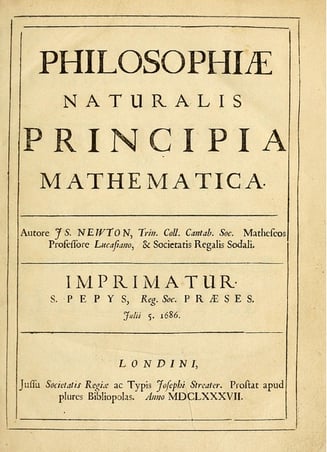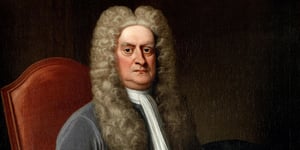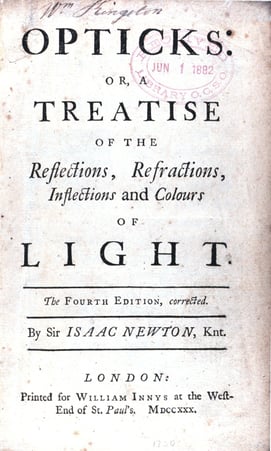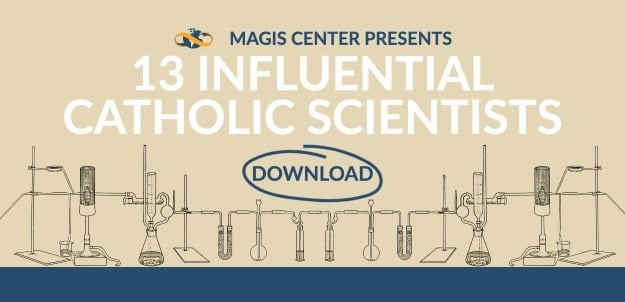Perhaps best remembered for recognizing gravity as the “force” acting on an apple as it fell from a tree and for his three Laws of Motion, Isaac Newton also developed the science of optics and calculus. According to most historians of science, Newton’s contributions to mathematics, mechanics, astronomy, and optics transformed physics, and his Optiks contributed to the development of the empirical or scientific method.
Less well-known is Isaac Newton’s interest in alchemy and theology. Newton wrote extensively on religious topics and embraced an anti-Trinitarian view which he believed to be the purest understanding of Christianity.
Isaac Newton’s Childhood and Early Education
Isaac Newton was born on Christmas Day, 1642, on a small farm, Woolsthorpe Manor, in Lincolnshire, England. His father, an illiterate farmer, died only a few months before he was born. After his mother remarried when he was three years old, he went to live with his maternal grandparents.
Isaac Newton was born in turbulent times. Puritanism was emerging in England as a cultural force while political turmoil reigned: the English Civil War began the year he was born, and by 1649, Charles I had been beheaded.
Newton’s grandmother taught him to read and write, and he eventually was sent to the Grantham Grammar School in 1655, where he was taught Latin, Greek, and some Hebrew. Grantham prepared him to enter Trinity College in 1661. At Trinity, he studied the typical coursework: Aristotle, Plato, logic, rhetoric, religion, and chronology. His interests strayed quickly into the new “mechanical philosophy,” studying Copernicus, Galileo, Kepler, Descartes, Hobbes, and Boyle. He began observing the planets and stars earnestly and carried out experiments imitating these great scientists.
In 1665, the Plague shut down Cambridge for almost two years. Newton returned home to Woolsthorpe Manor, where he conducted his experiments with light and observed the apple falling from the tree—which is still preserved on the property! In this incident, Newton recognized gravity as a universal force. During this annus mirabilis, he developed calculus, according to some, making him the leading mathematician in the world. He returned to Cambridge in 1667 as a fellow and built his first refracting telescope in 1669. In the meantime, his former professor recommended him for the Lucasion Professor of Mathematics, a post he assumed the same year.
Sir Isaac Newton on Light, Gravity, and the Three Laws of Motion
Newton developed the first reflecting telescope, which he demonstrated to the Royal Society and later to King Charles II in 1671. In the following year, he also presented the findings from his optical experiments to the Royal Society.
In his prism experiments, Newton effectively demonstrated that white light was composed of all the colors on the spectrum and proposed that it was made of particles and not waves. At the time, the President of the Royal Society, Robert Hooke (credited with discovering the cell and other contributions in multiple disciplines), took exception to his work, and the two men engaged in a heated debate. This lasted several years and ended only when Newton—who hated controversy—had a nervous breakdown and effectively went into isolation.
After Newton’s withdrawal from society, Edmund Halley visited him and asked a question. The question? “Could Newton demonstrate why a planet should move in an elliptical orbit when acted upon by a force of attraction from the sun that decreases in inverse proportion to the square of the distance between the two bodies?” Newton admitted to having solved the problem already but just needed to locate it in his notes! His answer was a nine-page document entitled “De Motu Corporum in Gyrum” (“On the Motion of Bodies in Orbit”). The propositions in “De Motu Corporum in Gyrum” were incorporated into his now-famous Philosophiae Naturalis Principia Mathematica (Mathematical Principles of Natural Philosophy) in 1686.

Philosophiae Naturalis Principia Mathematica by Isaac Newton, Public domain, via Wikimedia Commons
According to Isaac Newton scholar Stephen D. Snobelen, Philosophiae Naturalis Principia Mathematica revolutionized physics by using mathematical language to describe objects in motion:
- Book I lays out the foundations of Newton’s system of mechanics, the treating of the movement of bodies without resistance and identifying gravity as the force operating on moving bodies in space.
- Book II tackles the problem of the motion of fluids and the movement of solid bodies through fluids.
- Book III demonstrates how the law of gravitation operates consistently on moving bodies throughout the universe. Included in this great book are his inverse-square law of gravitation and his now-famous three laws of motion.
Before Newton, there was no concept of gravity as a force of attraction acting everywhere in the universe. Newton proposed that it is gravity that keeps objects in orbit around other bodies, whether planets around the sun or moons around a planet. Newton’s theory of universal gravity was essential to his Three Laws of Motion. These are:
- Every object in a state of uniform motion will remain in that state of motion unless an external force acts on it.
- Force equals mass times acceleration: F=MA.
- For every action, there is an equal and opposite reaction.
Isaac Newton’s London Years
From 1689-90 Newton served in the Convention Parliament as a representative of Cambridge University. During this time, Newton became friends with John Locke and worked diligently to organize his Calculus notes to publish them.
Newton moved to London permanently in 1696. He first took a minor position at the Royal Mint, then became Master of the Mint in 1699. His home life in London changed dramatically when his socially astute and connected niece, Catherine Barton, moved in with him shortly after his permanent move to London. Daughter of his half-sister Hannah, Catherine married John Conduitt, one of the wealthiest men in London, in 1717. They stayed in close contact with Newton throughout his later years, and it is through them scholars have access to Newton’s papers.
Optiks by Isaac Newton / Public domain, via Wikimedia Commons
Newton served in Parliament again beginning in 1701, at which time he resigned from his Fellowship and teaching position at Trinity College. Newton was elected President of the Royal Society in 1703 following the death of Robert Hooke. Freed from the opposition Hooke had displayed against his theories of light, Newton published his Optiks, which was based on lectures at Cambridge, a 1675 paper, and his diffraction experiments. Because of an emphasis on how experiments should be conducted, Optiks became a methodological guide for Isaac Newton’s contemporaries, the new “empiricists.”
Sir Isaac Newton’s Christian Beliefs
Although admired by many of his contemporaries for his revolutionary ideas—seemingly unhindered by religious authorities—Newton did not embrace a reductionist, materialist view of the cosmos. Quite the contrary.
Isaac Newton believed that a study of nature would lead one directly to God. In fact, according to Newton scholar Stephen Snobelen, Newton articulated an early form of the argument from design for God’s existence.
"Not only is this a stinging critique of the excesses of the mechanical philosophy, but it also contends that an inductive study of nature will lead to the conclusion that nature is ultimately contingent on the Creator. . . . Newton bolsters these arguments with a list of natural phenomena that he believes attest to the existence of a divine designer, including the motions of comets and planets, the placement of the stars and the bodies of animals." —Stephen Snobelen
Snobelen asserts in a related article:
"Only now are scholars beginning to study Newton’s manuscript corpus of one million words on alchemy and four million on theology to reconstruct a holistic view of the man in which his theology and natural philosophy are seen as equally important elements of the same grand unified project, the restoration of man’s original pristine knowledge of God and the world."
Sir Isaac Newton’s Religious Beliefs in Context
To understand Newton’s religious beliefs, we need to return to his early years at Cambridge. Newton’s study of Scripture intensified during these years because, having received a Fellowship, Newton should have applied for ordination after eight years. Influenced by the rise of Puritanism and other “primitive” sects, he had become convinced that Christianity, as practiced by the Church of England, was a corruption of a pure, primitive Christianity. Newton did not believe in the Trinity but believed that Scripture showed that “the Father alone is God.” In essence, he held the ancient Arian heretical belief that Jesus Christ was “God’s Son” but was created by God, denying Christ’s divinity.
Beginning in the 1670s, Newton also wrote several treatises on symbolism in the Books of Daniel and Revelation. Newton believed their prophecies would be fulfilled, that Christ would return to earth, and God’s Kingdom would be established.
Newton’s anti-Trinitarian beliefs remained unpublished and hidden from public view until recently. With the 2017 publication “Priest of Nature,” Robert Iliffe has opened the window into the heart and soul of Isaac Newton. It is beyond the scope of this post to review the contents of this work, but it should be mentioned as an essential read if one wishes to understand the brilliance and complexity of Isaac Newton.
Were Isaac Newton’s Theories “Revolutionary?”
It is perhaps one of those strange historical coincidences that Isaac Newton was born the same year Galileo died. It is not a coincidence, however, that Newton developed his three laws of motion after his reading of Galileo’s Mechanics.
It is said that Newton’s Principia Mathematica revolutionized physics. His book, Optiks, revealed the nature of light and contributed to the advancement of the scientific method. Isaac Newton’s universal law of gravity enabled us to understand planetary motion for the first time.
Newton was not, however, a man of the Enlightenment. He did not subscribe to the notion of a purely materialistic universe. He was attempting a scientific reformation, not trying to start a materialist/reductionist revolution. According to Snobelen:
Newton’s firm conviction in the argument from design, fierce opposition to scepticism and atheism, along with his fervent belief that he had recovered the lost wisdom of the ancients are not of the Enlightenment cast. Above all, his profound piety, biblicism and prophetic faith reveal his great distance from the classical Enlightenment.
In order to understand how Newton’s focus on experimental science is related to his religious worldview, we turn to another scholar, John Hedley Brooke. Brooke describes the scientific and theological reformation attempted by Newton and some of his contemporaries as a return to man’s original and pristine understanding of God and nature:
For some Protestant thinkers, experimental science promised a way of reversing the effects of the original curse, a way of making a better world that might in some small way mirror the perfection of God’s heavenly kingdom, a way of restoring the world to a condition fit for Christ’s earthly rule.
According to some scholars, what it meant to be an empiricist during Newton's life was under debate among philosophers. Unwittingly it seems, Newton’s reformation contributed to the Scientific Revolution of the Enlightenment in ways he could not imagine.
Notable Sir Isaac Newton Quotes
Great minds are often the source of notable quotes. Here are a few from Sir Isaac Newton:
- “If I have seen further it is by standing on the shoulders of Giants.”
- “I can calculate the motion of heavenly bodies but not the madness of people.”
- “What we know is a drop, what we don't know is an ocean.”
- “Gravity explains the motions of the planets, but it cannot explain who sets the planets in motion.”
- “No great discovery was ever made without a bold guess.”
- ‘This most elegant system of the sun, planets, and comets could not have arisen without the design and dominion of an intelligent and powerful being.’
The last quote highlights Newton’s Christian belief that by studying Nature, we can glimpse the mind of the Creator.
In conclusion, we will end with a quote from Newton scholar Stephen Snobelen:
It was Newton’s desire to construct a natural philosophy that demonstrated that nature was contingent on the existence of God, whether this be the beauty and symmetry seen in creation or the grounding of absolute space and time in God’s omnipresence and eternal duration. Newton’s God of dominion and his view of nature as dependent on God are two halves of a whole. And the correct understanding of each was the result of a right reading of the Books of Nature and Scripture respectively.
So did Sir Isaac Newton start the Scientific Revolution? It seems his attempt at a reformation failed, but it was indeed the start of a revolution that changed the world.



